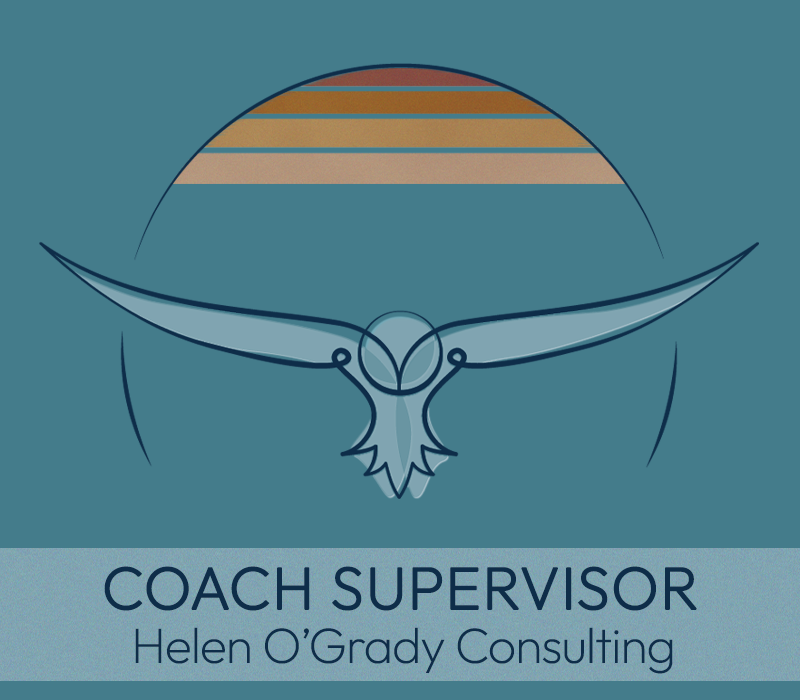

Is this you?
You’re a coach with a clinical or healthcare background - maybe nursing, psychology, medicine, or allied health.
You’ve done the training, you might be accredited, but you are definitely invested in becoming the best coach you can be.
But sometimes, quietly, you wonder:
- "Am I really doing this right?" Even after powerful sessions,
you still second-guess if you crossed a line, worked too hard, or wandered into mentoring or therapy territory
- You miss the clarity and support of a team.
You once had colleagues to debrief with, guidelines to lean on. Now, you're carrying your coaching alone - and it’s heavy
- You care deeply about your clients. Sometimes too deeply.
They share trauma, anxiety, or complex emotional stories, and you're left wondering,
“Should I have done more? Said less? Was that still coaching?”
- You’re committed to being a professional coach.
But you’re shocked that supervision isn’t even mandatory for some credentials
- You hold high standards, and want to work in a way that aligns with your ethics
- You’re proud of your coaching, but occasionally the doubt creeps in.
The kind that whispers, "Who do you think you are?"
especially after a hard session or a difficult disclosure
If any of this sounds familiar, you’re in the right place. Book a 30 minute introductory call about supervision to discuss how I can help.

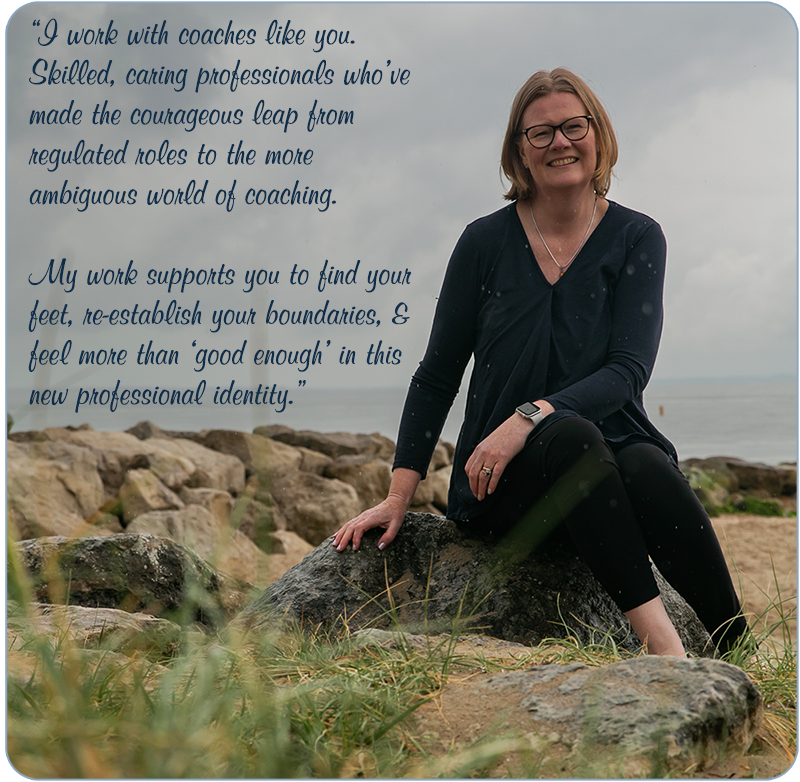
You care deeply, but you carry it alone.
You didn’t come into coaching lightly. You trained, you got accredited,
and you brought with you years of experience with you, years of working with complexity, ethics, and deep human connection.
But coaching doesn’t come with the same scaffolding. There’s no team to debrief with at the end of the day.
When a client shares something raw or frightening, it’s just you holding the space, and the emotional weight.
You’re thoughtful and boundaried, but still, certain clients stay in your mind long after a session ends.
You wonder if you did enough, said the right thing, or missed something important.
And because confidentiality and professionalism matter so much to you, there’s often no one you can talk it through with.
It’s not burnout, not yet, but it can be a quiet, chronic tension that leaves you feeling isolated and exhausted.
You’re proud to be a coach, but sometimes you feel like a fraud.
You used to introduce yourself with confidence. In healthcare, people knew what you did.
They respected it. You were part of something trusted and recognised.
Now when you say “I’m a coach,” the response feels different, vague interest, a polite smile,
maybe a bit of confusion. You’ve done the work, you’ve seen the impact of your coaching,
and your clients value what you bring. And yet, that persistent internal whisper shows up:
“Am I really good enough?”
When you blur into mentoring or bring your clinical insight into the room, the client thanks you
- but inside, you’re uneasy.
Was that coaching? Was I professional?
You hold yourself to high standards, and when you feel like you fall short, the doubt grows.
The more you question your value, the harder it becomes to show up with presence and ease.
You over-prepare, overthink, overwork. Coaching stops being spacious and starts to feel like a performance.
If any of this sounds familiar, you’re in the right place. Book a 30 minute introductory call about supervision to discuss how I can help.

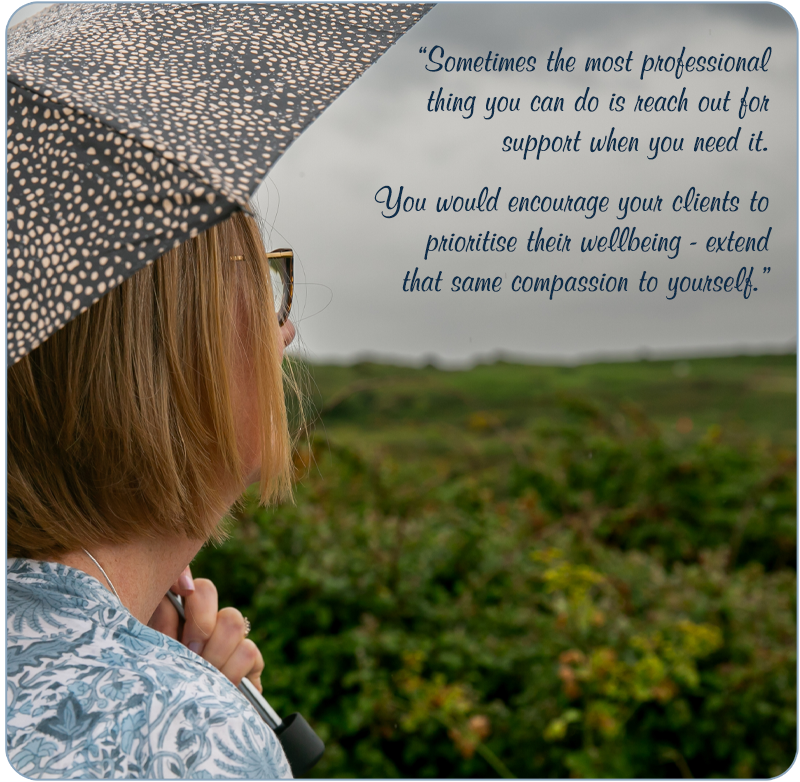
You want to feel professional, not just act it.
You’ve invested in CPD.
You’ve listened to all the coaching podcasts.
You’ve probably taken more training than you’ll ever need.
You tell your clients they’re resourceful and resilient, but you don’t always extend that same compassion to yourself.
You want to coach with clarity and integrity, to trust yourself fully in the moment
- but the unspoken doubts can cloud even the best session.
You suspect that what you really need isn’t more learning, but a place to unlearn.
A space to examine the habits you’ve carried from clinical work, the perfectionism, the over-functioning,
the impulse to fix, and gently lay down what no longer serves you.
Supervision isn’t just about ‘checking the ethics box’. It’s your space to feel seen, supported, and strengthened.
Because you deserve to feel as grounded and confident in your coaching identity as you once felt in your healthcare role.
Is this You?
You’re a coach with a clinical or healthcare background - maybe nursing, psychology, medicine, or allied health.
You’ve done the training, you might be accredited, but you are definitely invested in becoming the best coach you can be.
But sometimes, quietly, you wonder:
- "Am I really doing this right?" Even after powerful sessions,
you still second-guess if you crossed a line, worked too hard, or wandered into mentoring or therapy territory
- You miss the clarity and support of a team.
You once had colleagues to debrief with, guidelines to lean on. Now, you're carrying your coaching alone, and it’s heavy
- You care deeply about your clients. Sometimes too deeply.
They share trauma, anxiety, or complex emotional stories, and you're left wondering,
“Should I have done more? Said less? Was that still coaching?”
- You’re committed to being a professional coach.
But you’re shocked that supervision isn’t even mandatory for some credentials
- You hold high standards, and want to work in a way that aligns with your ethics
- You’re proud of your coaching, but occasionally the doubt creeps in.
The kind that whispers, "Who do you think you are?"
especially after a hard session or a difficult disclosure
If any of this sounds familiar, you’re in the right place. Book a 30 minute introductory call about supervision to discuss how I can help.

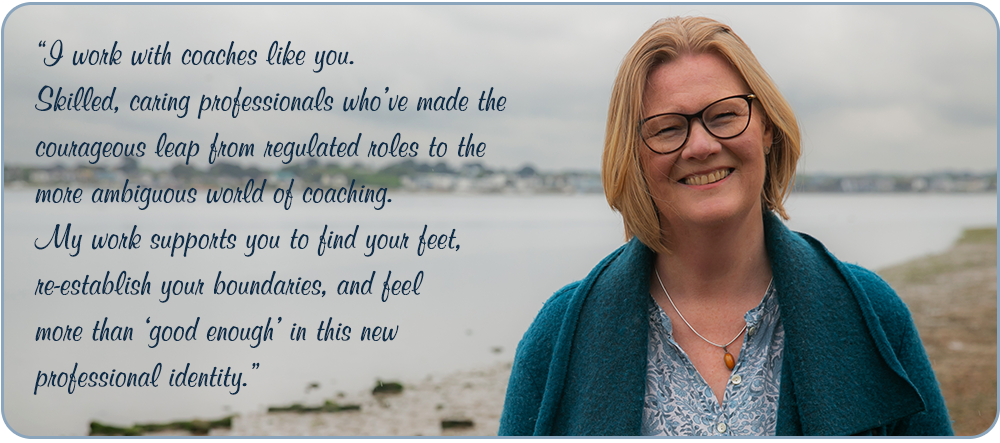
You care deeply, but you carry it alone.
You didn’t come into coaching lightly. You trained, you got accredited,
and you brought with you years of experience with you, years of working with complexity, ethics, and deep human connection.
But coaching doesn’t come with the same scaffolding. There’s no team to debrief with at the end of the day.
When a client shares something raw or frightening, it’s just you holding the space, and the emotional weight.
You’re thoughtful and boundaried, but still, certain clients stay in your mind long after a session ends.
You wonder if you did enough, said the right thing, or missed something important.
And because confidentiality and professionalism matter so much to you, there’s often no one you can talk it through with.
It’s not burnout, not yet, but it can be a quiet, chronic tension that leaves you feeling isolated and exhausted.
You’re proud to be a coach, but sometimes you feel like a fraud.
You used to introduce yourself with confidence. In healthcare, people knew what you did.
They respected it. You were part of something trusted and recognised.
Now when you say “I’m a coach,” the response feels different, vague interest, a polite smile,
maybe a bit of confusion. You’ve done the work, you’ve seen the impact of your coaching,
and your clients value what you bring. And yet, that persistent internal whisper shows up:
"Am I really good enough?"
When you blur into mentoring or bring your clinical insight into the room, the client thanks you
- but inside, you’re uneasy.
Was that coaching? Was I professional?
You hold yourself to high standards, and when you feel like you fall short, the doubt grows.
The more you question your value, the harder it becomes to show up with presence and ease.
You over-prepare, overthink, overwork. Coaching stops being spacious and starts to feel like a performance.
If any of this sounds familiar, you’re in the right place. Book a 30 minute introductory call about supervision to discuss how I can help.

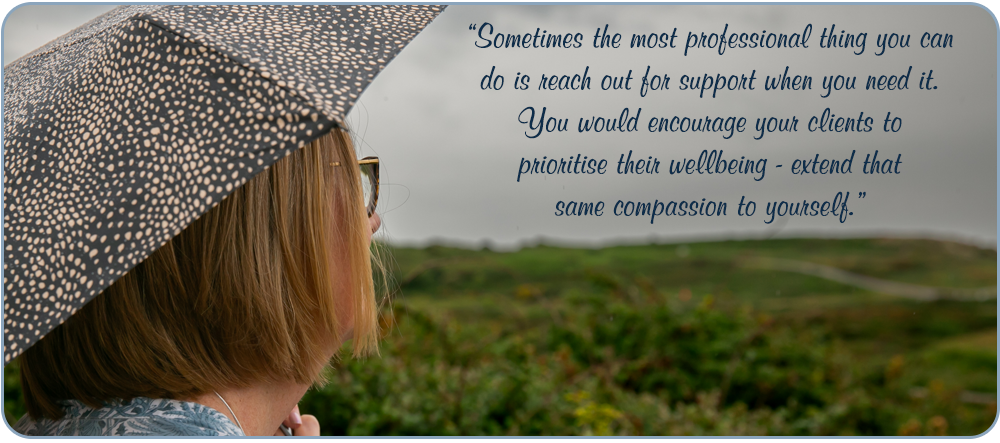
You want to feel professional - not just act it.
You’ve invested in CPD.
You’ve listened to all the coaching podcasts.
You’ve probably taken more training than you’ll ever need.
You tell your clients they’re resourceful and resilient, but you don’t always extend that same compassion to yourself.
You want to coach with clarity and integrity, to trust yourself fully in the moment
- but the unspoken doubts can cloud even the best session.
You suspect that what you really need isn’t more learning, but a place to unlearn.
A space to examine the habits you’ve carried from clinical work, the perfectionism, the over-functioning,
the impulse to fix, and gently lay down what no longer serves you.
Supervision isn’t just about ‘checking the ethics box’. It’s your space to feel seen, supported, and strengthened.
Because you deserve to feel as grounded and confident in your coaching identity as you once felt in your healthcare role.
Back to Top
|
